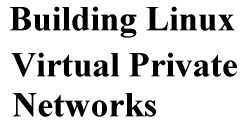

|
This page offers reviews of Building Linux Virtual Private Networks from various sources. If
you know of a review that we don't know about, drop us
a note at webmasters@buildinglinuxvpns.net. We will reprint or link to every review
we know of, even if they think our book sucks.
Full length reviews available online:
Inside Cover Quote:
"This is the VPN book I wish I'd written. It explains enough about the protocols and issues to clarify the difficulties for the novice, and supplies page after page of clearly-commented examples -- the only way to learn how to make a virtual private network work! Building Linux Private Networks will be top of my list when people ask what they should read about this complex networking topic."
Other Online Quotes:
"This book so thoroughly covers its general field, in this case virtual private networks (VPNs), that it is useful to security people regardless of whether or not they use Linux. There are abundant practical considerations in this work that other volumes ignore.
"I have had an interest in VPNs for quite some time; however, finding information on VPNs that is easily digestible is difficult. I have looked at several books on the subject and most of them are written in a manner that lends more to confusion than enlightenment (IMHO). Recently I bought a book regarding VPNs that was earning rave reviews: "Building Linux Virtual Private Networks (VPNs)" by Oleg Kolesnikov and Bri Hatch. You may recognize Bri Hatch from his book "Hacking Linux Exposed"-- another title I would recommend for those interested in security.
Amazon.com
Step by step instructions that WORK!, 29-Jul-2003
They get all this out of the way quickly. Many books that are dedicated to VPNs only talk about this part of the equation, and do so for hundreds of pages. Oleg and Brian get it all down so you can digest it in a sitting and have everything you need to know. The remaining chapters cover specific VPN protocols. I needed to support PPTP for the majority of my windows clients, and IPSec for my remote offices and more recent laptops that suppported it. I literally built these VPNs by reading and copying in text (yes, I could have got the code off the web page, but nothing is better than doing it yourself) as I went along. Not a single problem, it was smoother than smooth.
I can't recommend this book enough. If you want a VPN on Linux (or other Unix for that matter) then this is the book for you.
Editorial Review
There's a nice balance of managerial information (useful
for justifying a VPN, and a Linux one in particular, to
your boss) and technical details in these pages. Each of
the covered packages gets nice documentation, complete
with listings of configuration files and explicit
statements of console input and output.
One of the book's amazing features is its willingness to not rehash "common knowledge." In other words, BLVPN assumes people who read books on Linux VPNs know something about two subjects: (1) Linux and (2) networking. Therefore, BLVPN doesn't waste time teaching the reader how to use the command line, and it doesn't include yet another boring description of the OSI model. Instead, BLVPN launches straight into practical, operational instructions for creating virtual private networks. I would like to see other authors adopt this approach! Some of the book's key strengths include troubleshooting hints, clear diagrams, directory listings for key files, complete sample configuration scripts, and discussions of advantages and disadvantages of various VPN solutions. Furthermore, the text is supported by a web site with copies of the scripts available for download. Because each chapter is a self-contained unit for each VPN technology, readers can pick a solution and begin immediate implementation. No other VPN book delivers implementation-grade advice like this. My only regret was a failure to mention interoperability with BSD-based IPSec implementations. I would have loved to see a chapter on matching FreeS/WAN for Linux with KAME/racoon for FreeBSD. The authors should also consider describing how to configure Windows 2000/XP in IPSec tunnel mode to interoperate with IPSec on Linux and/or FreeBSD. Additionally, I believe I found typos in the figures on pages 168-9. I expect the book's web site errata page to publish a correction, if necessary.
If you need to build host-host, host-network, or
network-network VPNs using Linux (or really any open
source platform), "Building Linux VPNs" is your book.
I recommend "Virtual Private Networks" by Yuan and
Strayer as a complementary volume for those needing
additional material on VPN theory and protocol encapsulation.
I've read pretty much every VPN book out there, and have been dissapointed at every turn. Even the one by O'Reilly, normally a really great publisher, didn't have actual implementation details that are necessary. Building Linux Vpns gives you a great introduction in the first two chapters to get you up to speed, teaches you all the right terminology, possible network layouts, and stuff, and then dedicates the rest of the book to easy-to-follow step-by-step implementation details. After reading the book it took 2 hours from start to finish for me to get our two offices connected via VPN (I went with IPSec / Freeswan), simply following the instructions. I'm in the middle of testing the PPTP setup for home access for those PC folks, and it is working exactly as promised.
If you actually need to understand vpn ideas and be able
to build one, this is the book for you.
Barnes and Noble Have bought a lot of dissapointing VPN books in the past. Was given a copy of Building Linux VPNs at RSA 2002 in San Jose, and it did everything right. If you need to get a SECURE vpn up and running, this is the book for you.
Also recommended: Recent picks have included
Hacking
Linux Exposed (same author), Writing Secure Software.
Amazon.co.uk
So far I am amazed. It really has all the setup I needed
to get 2 different VPN variants working between my three
offices. Two use Linux firewalls, and one uses
OpenBSD. I really recommend this book.
Bookpool.com
This book finally shows you exactly what you need to do
to make VPNs work. So many authors out there should take
this book home with them and learn how to write to their
audience without needlessly filling their books with four
chapters of repetative cruft. Kudos to Kolesnikov and
Hatch.
When I saw on the hacking linux page that the author had another book coming out, I preordered it, and am glad I did. This book is equally readable, technically accurate, engaging, and instantly usable in the real world.
I've read up to chapter 8 so far, and it's written in a
very consistant voice. Kolesnikov and Hatch did a great job
of putting this book together. I look forward to any books
they put out in the future.
| |||||||||||||
| Home |
| Contents |
| Authors |
| Reviews |
| Errata |
| Colophon |
| Source Code |
| Sample Chapter |
| Suggested Reading |
| Purchase |

